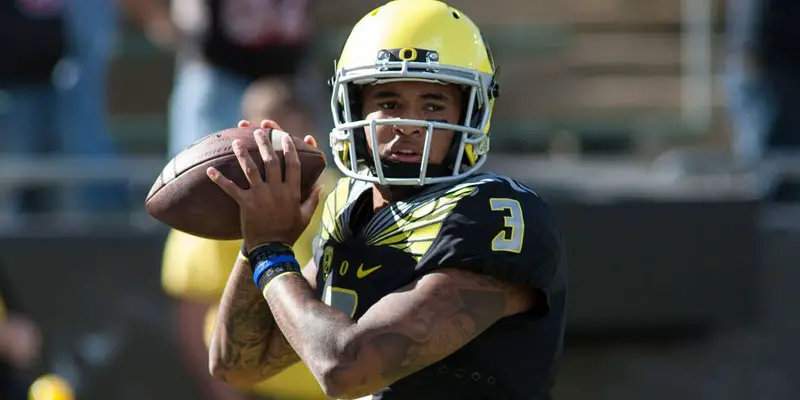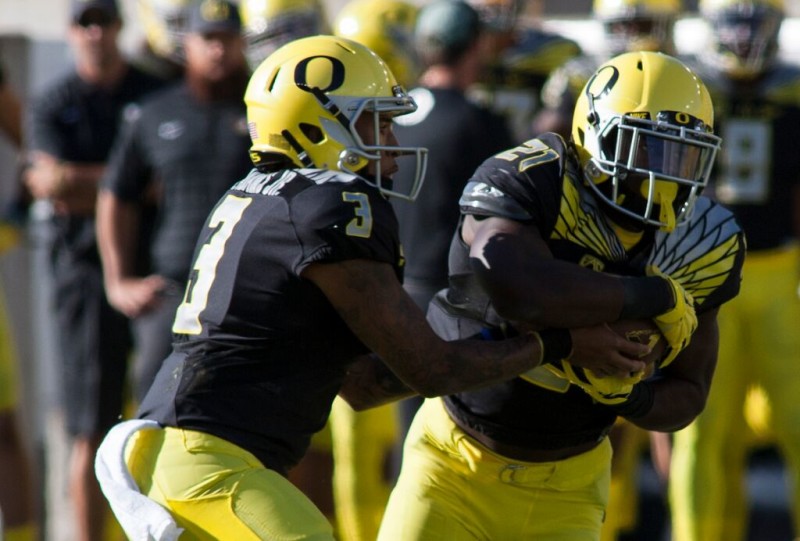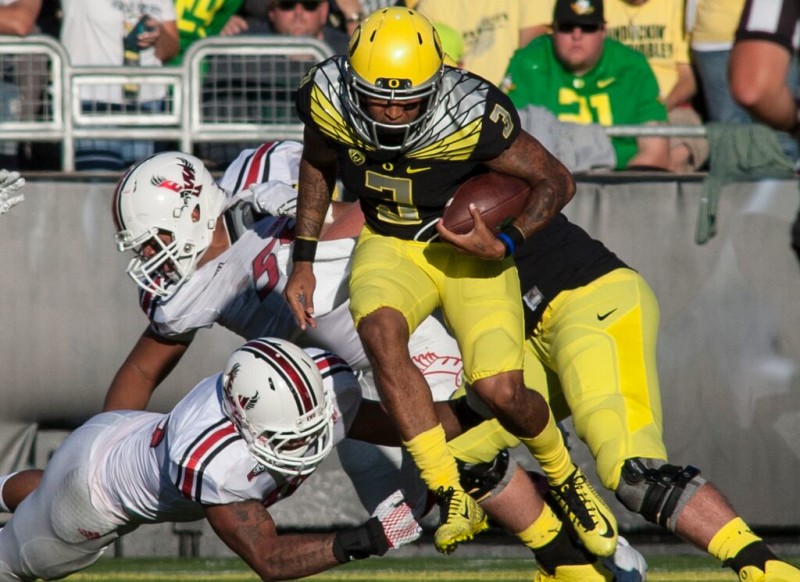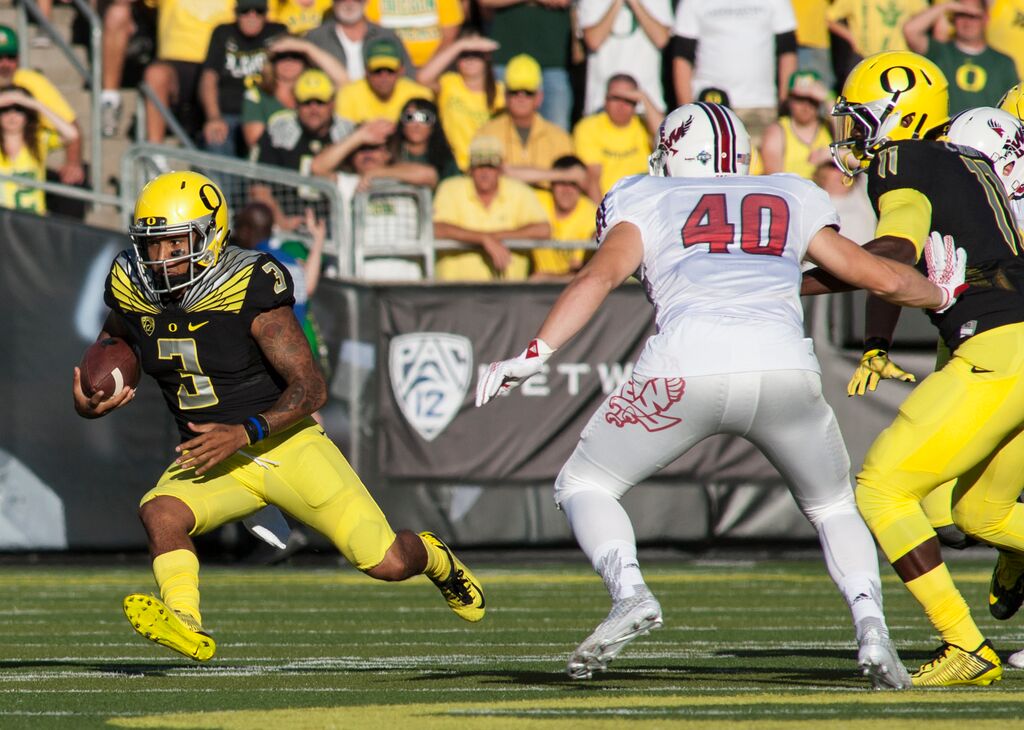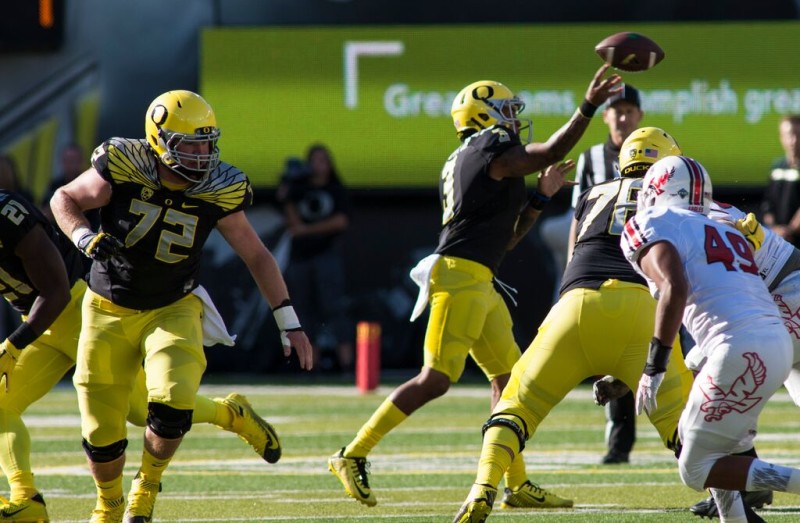Rarely is there an opportunity to outshine your predecessor when your predecessor is a Heisman Trophy winner. But freshly-minted Oregon quarterback Vernon Adams did just that on Saturday, demonstrating an ability that exceeds even that of Marcus Mariota: the ability to move the needle of public interest.
Not only is Adams’s presence drawing national attention, but he’s showing he can move tickets as well, with seats selling for 30% or more over face value on the secondary market, something even more uncommon in games against FCS competition.
Of course, some of that draw may lie in the intrigue created by Adam’s decision to leave his former team, FCS juggernaut Eastern Washington, to play for Oregon. In case you haven’t heard, that decision has been a tad controversial. Reports are that Adams has been largely shunned by the Eastern Washington community as a result.
Many of his former teammates refuse to speak to him — with one even targeting him in Saturday’s game — and his former coach, Beau Baldwin, banned Adams from all Eastern facilities, citing a competitive necessity given the Eagles’ season opening match-up against Oregon.
That logic works at face value. If the Ducks were playing the Tennessee Titans this week, I’m sure Mariota training in Eugene wouldn’t be high on Oregon’s list of priorities. But I can’t imagine them ever shunning a player who made the contributions that Mariota made, contributions that compare to what Adams did for Eastern Washington.
He may not have won a national championship, or received a Walter Payton Award – for FCS player of the year — but he achieved something much more rare. While 37 FCS teams have won national championships, only four have ever defeated a ranked FBS team, as Eastern Washington did against Oregon State in 2013, and nearly did again, for what would have made two straight wins over ranked FBS teams, in a narrow loss to Washington last season. Adams was undeniably the biggest reason they were as competitive as they were in both those games.
Baldwin said regarding Adams’ transfer, “It’s not what the rule is intended for,” but one needs only to look around the college football landscape to see what Baldwin’s true intent is in that statement. It’s not about “college free agency,” as many opponents of the transfer rule have claimed, it’s about restricting college athletes’ freedom of choice.
The temperature of the players’ rights issue is on the rise. From lawsuits demanding compensation for player likeness in video games, to efforts to add a “cost-of-attendance” stipend to athletic scholarships, to the petition at Northwestern for the formation of a player’s union, the narrative is taking shape. But these endeavors are being opposed by coaches and pen-pushers alike, who use thinly veiled claims to mask their true intention: to exert control.
Coaches such as Urban Meyer and Dabo Swinney, have banned their players from using social media — a move which is potentially unconstitutional. Coaches such as Tommy Tuberville and Virginia Tech defensive coordinator, Bud Foster have expressed interest in fining players for rules violations, out of their cost-of-attendance compensation.
Virginia Tech president Timothy Sands notified the public real quick that they would not be fining players. As the balance between players’ rights and coaches’ influence continues to unfold, it’s becoming obvious why this transfer rule is really being opposed: Players have gained more freedom and opportunity as a direct result of increased exposure, and coaches whose successes have come at the cost of the absolute subordination of their players and total control of those players’ options, are trying to extend their reach over things that threaten the status quo.
Or basically, things they don’t like. But information on how unhealthy these controlling environments can be, is free and easily disseminated among a landscape growing less supportive of unilateral authority in college sports.
This is no false issue. Limiting the freedom that graduate transfers have would allow coaches the ability to control a player, after that player’s undergraduate career had ended. If we take, at face value, the NCAA’s steadfast positions that players are student-athletes and not employees, and that the return for playing sports is an education, then the obligation a player has to a particular school ends at graduation. If, after that, he still has eligibility, the student-athlete should be free to renegotiate their relationship with a given school when they begin the next step of their career.
If players are obligated to their undergraduate institutions for the duration of their eligibility, and not the duration of their education, it sends the message that a student-athlete’s education is secondary to his athletic performance. A rule change restricting graduate transfers is an admission of that message. While many student-athletes may or may not choose an institution based solely on its athletic program, this is a choice the student is free to make, and it does not relieve the school of its primary purpose, which is to educate.
The beauty of the graduate transfer rule is two-fold. First, it’s the only rule that actively rewards players for academic success by allowing them to bypass the waiting period that non-graduate transfers are subject to; secondly, it’s the only academically-based rule — beyond basic eligibility — that has any real potential to impact what happens on the field.
So rare are these rules that tie academics to athletic outcomes, that, years ago, when Mike Leach suggested conference tiebreakers be decided by grade-point average, the response was little more than a collective eye-roll from college football’s decision makers.
College itself is often a bridge to maturity, where the transition from childhood to adulthood takes place for many people. It is difficult to pinpoint exactly when college students become adults, but by modern standards, we know they frequently tend to enter school as adults in legal standing only.
But by the time they graduate, they are far more prepared for adult life. College teaches students how to make adult decisions and do adult things, and the only reasons to restrict a student’s freedom of choice should be if they demonstrate the inability to make solid decisions for themselves, or if they make ones that will cause a degree of irrevocable damage.
I don’t know Vernon Adams personally, but for all his public exposure, nothing suggests he can’t make adult decisions. Quite the contrary, and not just on the football field, where his next interception will be his first as an FBS player, but also in terms of his future. Adams has said his motivation for transferring to Oregon was his belief that it would significantly improve his professional options.
Whether this means playing football or coaching it, it is exactly how a career decision should be made: One that moves an individual closer to establishing his career.
The gamble involved in his decision is the type of high-risk, high-reward dynamic that few college students will grasp or attempt. Adams, in his final year of eligibility, chose to bet on himself. He was willing to leave a school where he was celebrated as a living legend, for another that could only guarantee a chance to compete, all in the hopes of furthering his career.
Most college students are taught a linear relationship between hard work and success, and while hard work is necessary for success, careers are often made or broken by a series of calculated gambles. That Adams was willing to sacrifice the security he built and the relationships he forged, shows he is not a person on whom choice is a misplaced freedom.
So, I’m sure that everyone who has been impacted by his transfer is happy to have Saturday’s game in the books. Adams is not a controversy anymore, nor is he the shiny new quarterback gunning for his old team. That chapter ended Saturday night. He’s just another Oregon Duck now, happy to move forward with his season and free to pursue his career.
Top photo by Gary Breedlove
Related Articles:
Chip Kelly Update: Everything's Good Again ...
Chip Kelly Update: Wailing and Gnashing of Teeth
Shock and Awe -- The Oregon Ducks' Football Hangover Effect
Despite Lopsided Score, Georgia State "Never Stopped Believing"
Hope Springs Eternal for Ducks
Incompetent Pac-12 Officials: How Do You Miss ALL of THIS?
Nathan Roholt is a senior writer and managing editor emeritus for FishDuck. Follow him on Twitter @nathanroholt. Send questions/feedback/hatemail to nroholtfd@gmail.com.

